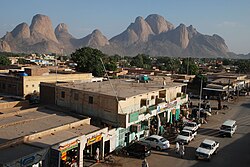Kassala
|
Kassala كسلا |
|
|---|---|
 |
|
| Location in Sudan | |
| Coordinates: 15°27′N 36°24′E / 15.450°N 36.400°E | |
| Country |
|
| State | Kassala State |
| Population (2008) | |
| • Total | 419,030 |
Kassala (Arabic: كسلا, Arabic pronunciation: ['kasalaː]; Italian: Cassala) is the capital of the state of Kassala in eastern Sudan. Its 2008 population was recorded to be 419,030. Built on the banks of the Gash River, it is a market town and is famous for its fruit gardens. Many of its inhabitants are from the Hadendoa group, with others being of Rashaida origin. It was formerly a railroad hub, however, as of 2006 there was no operational railway station in Kassala and much of the track leading to and from the town has been salvaged or fallen into disrepair. Kassala's location along the main Khartoum-Port Sudan highway makes it an important trade center.
The city was originally created as a military camp for the Ottoman soldiers of Egyptian viceroy Muhammad Ali in 1840 during his military offensive into Sudan. In 1885, Kassala was subsequently captured by the Mahdists. In 1894, after the Battle of Kassala the Italians captured the city. In 1897, the Kingdom of Italy returned Kassala to the Kingdom of Egypt. In 1899, Kassala fell under the purview of Anglo-Egyptian Sudan until Sudanese independence in 1956.
In July 1940, during the East African Campaign, Italian forces advancing from Italian East Africa forced a small British garrison to withdraw from Kassala. The Italians then occupied the city with a brigade-sized unit. In mid-January 1941, the Italians withdrew from the city and a British garrison returned.
...
Wikipedia

